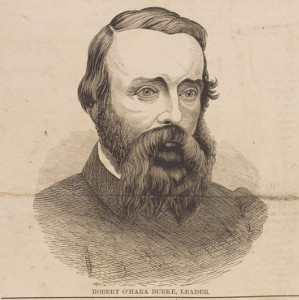[Editor: This article about Robert O’Hara Burke, of the Burke and Wills expedition, was published in A Tribute to the Memory of Burke and Wills (broadsheet), 1862.]
Robert O’Hara Burke.

Robert O’Hara Burke was sprung from an Anglo-Celtic race, whose highest characteristics were loyalty, generosity, and a spirit of heroic enterprise. The fire of the O’Haras of the Heights seems to have been beautifully tempered by the chivalrous spirit of the Norman De Burgos in the subject of this biographical notice, for we have it on the most undoubted authority that the Australian Explorer was as remarkable for benign amiability as he was distinguished for a strong resolute will. He possessed a temperament in which calm enthusiasm and decided energy were happily blended. Nature intended him for a hero; but she ordained that the field of his heroism should be found where patience was more requisite than courage — or rather, where the union of both was indispensably necessary to achieve success.
The mere dates of such a man’s life cannot be uninteresting to any Australian; besides certain facts accompany those dates which help to indicate how circumstances fitted him for the glorious although in one respect mournful event of his life. Robert O’Hara Burke was born at St. Clerans, County Galway, Ireland, early in the year 1822. He was one of four brothers, all of them distinguished for intrepidity and a high sense of honour, and three of whom at time held commissions in the British Army. One fell in the Crimean War; another is supposed to have fallen in the late Chinese War; and the third is now, if in the service, probably in a high position in the British Army. Robert O’Hara, to whose memory we publish this tribute, after completing his education in Belgium, joined the Austrian service in a regiment of Hungarian Hussars, and there distinguished himself both as an active soldier and a high-souled officer. Subsequently he returned to his native country and obtained an eminent post in the Irish Constabulary, which he occupied till he immigrated to Australia in 1853. He obtained highly honorable employment in Melbourne, in which he energetically discharged his duties till the Russian war expanded into such vast proportions, that he determined no longer to keep aloof from such a wide arena of glory. He set out for England, but arrived too late to take part in the historic struggle which drew him thither. He returned again to Victoria, and remained in the service of the Government till he undertook that expedition which through so direful a cross brought him so bright a crown.
Burke was mild but cheerful; courageous but patient; of energetic will, but open to conviction, and much influenced by friendly advice. He is every way worthy of the highest honours we can pay to his memory.
Source:
A Tribute to the Memory of Burke and Wills (broadsheet), South Sydney (NSW): W. T. Baker, [1862]
Leave a Reply